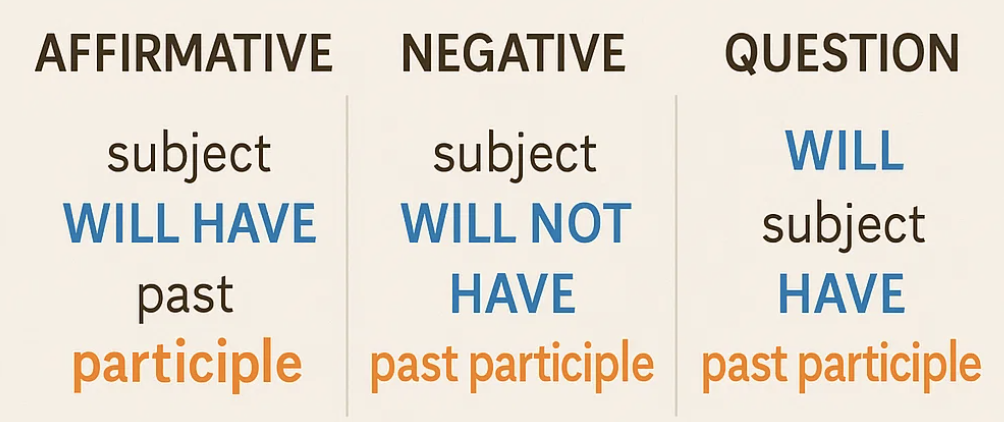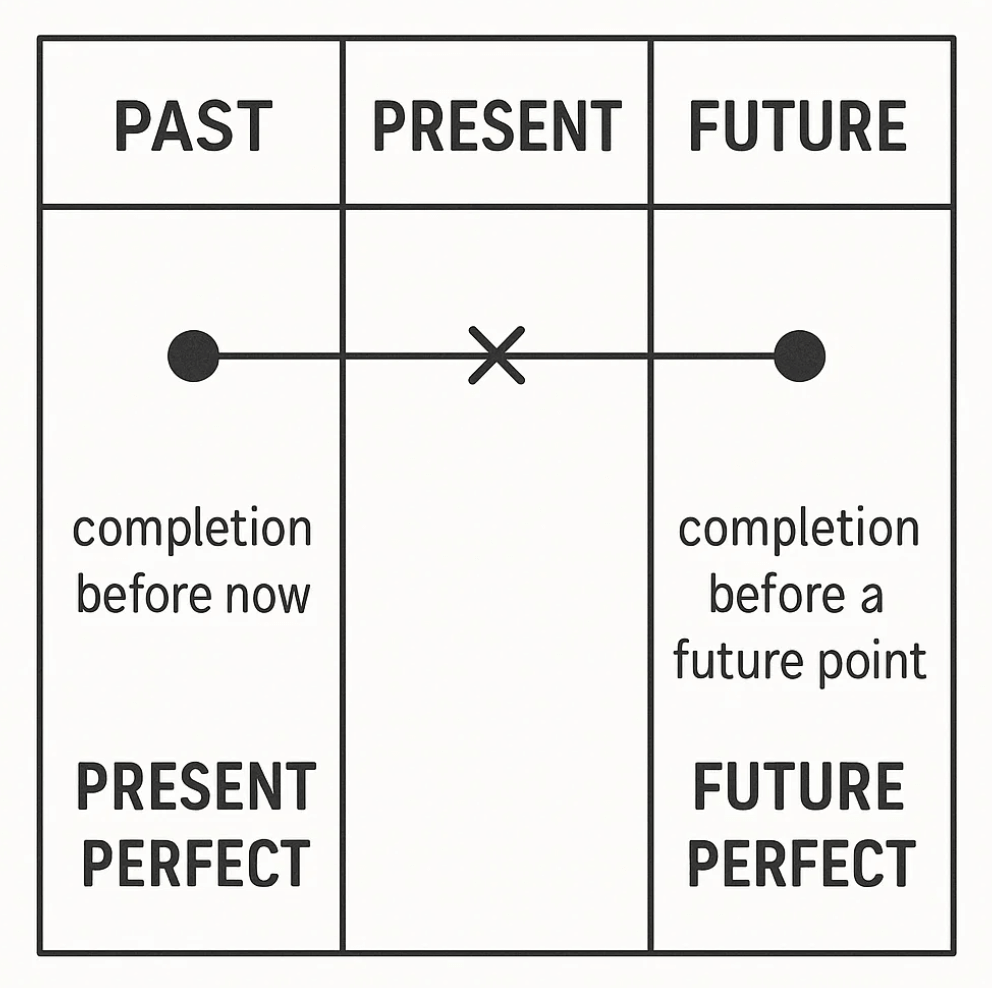Introduction to Future Perfect Tense
The future perfect tense is one of the less commonly used English tenses, but it is extremely useful when you want to talk about something that will be completed before a specific time in the future. Learners often find it confusing because it combines “future” with “perfect,” but the idea is simple:
👉 By a certain point in the future, an action will already be finished.
In this article, you will learn the structure of the future perfect tense, how to use it with examples, the difference between it and other tenses, and you’ll finish with practice exercises and answers.
If you're unsure of a word, check below if it is in the Glossary. If it isn't, you can try our free dictionary.
Join over 500+ learners
Join the community for free resources and other learning opportunities.
No spam — only valuable English learning content.
What Is the Future Perfect Tense?
The future perfect tense describes an action that will be completed before another time or event in the future.
- By 2026, she will have finished her degree.
- They will have left before we arrive.
This tense is common in writing, academic contexts, and formal speech when talking about goals, deadlines, and predictions.
Forming the Future Perfect Tense
The structure is:
Subject + will have + past participle
- I will have completed the report by Friday.
- She will have gone to bed by midnight.
Affirmative
- They will have travelled to five countries by the end of the year.
Negative
- He will not have finished his homework before dinner.
- We won’t have saved enough money by next summer.
Question Form
- Will you have completed the project by the deadline?
- What will she have achieved by this time next year?

When Do We Use the Future Perfect?
1) To Show Completion Before a Specific Time
- By 9 a.m. tomorrow, I will have left for the airport.
- By the time you wake up, she will have cooked breakfast.
2) To Talk About Deadlines
- The builders will have finished the house by December.
- You will have submitted your essay before the exam period begins.
3) To Predict Past-from-Future Outcomes
- He will have forgotten all about it by next week.
- They will have arrived before the storm starts.
4) To Express Certainty About the Past (in relation to the future)
- By now, she will have realised her mistake.
- The meeting will have started by the time we get there.
Timeline Visualisation
Imagine a horizontal line showing “Now” → “Future.”
Place a dot labelled “Future event” (e.g., next Friday).
Draw an arrow backwards from that dot with text: Action already finished → Future perfect.
Example: By next Friday, I will have completed the project.
Signal Words Commonly Used with the Future Perfect
- by + time (by tomorrow, by 2025, by next week)
- by the time (by the time we arrive, by the time you finish)
- before (before you know it, before the deadline)
- within (within two years, within the next month)
Comparison with Other Tenses
Future Simple vs Future Perfect
- Future simple: I will finish my homework tomorrow. (focus on doing it in the future)
- Future perfect: I will have finished my homework by tomorrow. (focus on completion before a time)
Present Perfect vs Future Perfect
- Present perfect: I have finished my homework. (action completed before now)
- Future perfect: I will have finished my homework by tomorrow. (action completed before a future time)

Master Tenses and Boost Your Vocabulary
Learn grammar in context and expand your IELTS vocabulary with 1000 bilingual flashcards designed for Band 7.5+.
Get the FlashcardsCommon Mistakes with the Future Perfect
- Using present perfect instead of future perfect
❌ By next week, I have finished.
✅ By next week, I will have finished. - Forgetting “have”
❌ I will finished my work.
✅ I will have finished my work. - Mixing with future continuous
- Future continuous (ongoing): At 8 p.m., I will be working.
- Future perfect (completed): At 8 p.m., I will have finished work.
- Wrong participle
❌ She will have went.
✅ She will have gone.
Practical Examples in Context
- By the time you read this article, thousands of students will have improved their grammar.
- When the company celebrates its 100th anniversary, it will have achieved many milestones.
- Within five years, researchers will have discovered new treatments.
- By the end of the season, the team will have played 38 matches.
Exercises: Test Your Understanding
Fill in the blanks
- By 2030, scientists ______ (develop) better technology.
- She ______ (finish) her book before the holiday starts.
- Will you ______ (complete) the training by next month?
- They ______ (not/arrive) before the show begins.
- By next week, we ______ (move) into our new house.
Match the Sentences
Which tense is correct?
a) By next year, I will complete the course.
b) By next year, I will have completed the course.
Answer: b (because it’s finished before a future time).
Conclusion
The future perfect tense allows you to express confidence about what will already be finished by a future moment. The key formula is simple: will have + past participle. Use it for deadlines, long-term goals, and predictions about completion. With practice, you’ll use it naturally to sound precise and confident in English.
👉 Continue exploring our grammar articles for more guides on pronouns and their correct usage:
Past Continuous Tense Explained with Examples
Present Simple vs Present Continuous
Future Perfect Tense Made Easy
Countable vs Uncountable Nouns
Comparatives and Superlatives Exceptions
Glossary Section
- Tense (noun): a verb form showing time.
- Past participle (noun): the third form of a verb (e.g., gone, finished, written).
- Deadline (noun): the latest time by which something must be completed.
- Completion (noun): the act of finishing something.
- Prediction (noun): a statement about what will happen in the future.
- Affirmative (adjective): a positive sentence form.
- Negative (adjective): a sentence form using not.
- Certainty (noun): complete confidence something is true.
Comprehension Practice
Questions
- Which structure is correct for the future perfect?
a) will + base verb
b) will + have + past participle
c) have + past participle - Which sentence shows a deadline?
a) By Friday, I will have finished my essay.
b) I finish essays every week. - True or False: The future perfect tense describes actions happening right now.
- Fill the gap: They ______ (not/finish) by the time you arrive.
- Which tense shows “completion before a future time”?
a) Future simple
b) Future perfect
c) Future continuous
Answers
- b
- a
- False
- will not have finished / won’t have finished
- b
Join over 500+ learners
Join the community for free resources and other learning opportunities.
No spam — only valuable English learning content.
